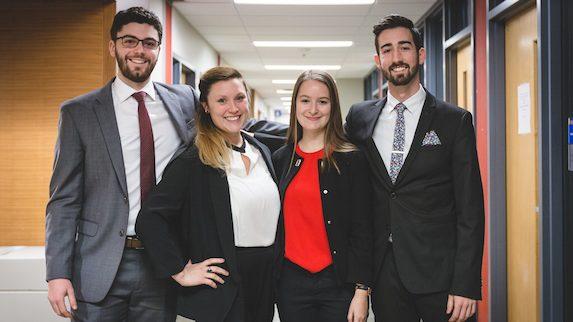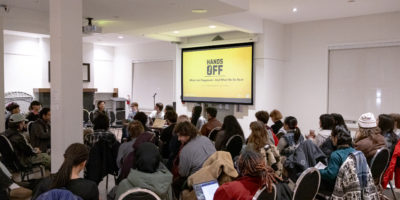By Neha Chollangi
A University of Montreal business team won first place in a business ethics competition held by Ted Rogers School of Management on Nov. 19.
The ethics case required the team to make a decision regarding a hotel manager in Kenya who might have been involved in bribery.
The team’s winning solution was to not fire the manager due to the lack of concrete proof. The team also said it would implement strategies directed at the manager and the company’s employees to fight corruption and promote ethical thinking.
Eight teams of undergraduate business students from across Canada received one week to prepare and present a plan in front of judges that tested their leadership and ethical judgement. The first-place winners received $4,000.
The winning team consisted of Audree Lavoie-Archambault, Andrew Coffey, Charles Legris and Aurélie Michaud.
Jean-François St-Pierre, the winning team’s coach, said he has never seen a business ethics competition take place in Canada before. He realized that neither he nor his team knew much about business ethics or how to approach a business ethics case. They did most of their research online while finding business ethics cases from past U.S. competitions.
Lavoie-Archambault, who majors in sustainable development, was the only team member familiar with ethics.
“It’s a matter of corruption and the reality of the business world today,” St-Pierre said of understanding ethics. “Our students need to know how to deal with it in their undergraduate years before they become young professionals.”
“Caring for humans is really important more than ever in the business industry when we are looking at the level of corruption in North America and all over the world,” he said.
Coffey, who is studying accounting, did not have any ethics courses to take as a part of his bachelor’s degree. However, Coffey strongly believes that all business students should take these ethics courses in order to reflect on unethical actions in the workplace.
For Legris, language was a big challenge in the competition. “I’m from a French family and I don’t have a lot of opportunities to speak in English. So, I really practiced a lot,” he said.
Legris was optimistic that even though he had an accent, practice could make the judges understand his pitch. He saw language as a “challenge instead of a barrier.” It was Legris’ first business competition and he found it very rewarding to win after working very hard to learn about business ethics for the first time and to practice his English.
The Montreal students worked on the case they received for a week and successfully solved it.
They said the pitch was the easy part because the team had been practicing presentations for the last three months.
“To be honest, we finished our PowerPoint presentation on the train on our way to Toronto and practiced the pitch for the first time in our hotel room,” Michaud said.
“Corporations have an enormous amount of power nowadays, they own the money and control the media and resources. Their actions have a tremendous impact on society as a whole, which is why I believe that for them to act ethically is not just a ‘bonus’, as some people put it, but an absolute necessity,” Michaud said.













Leave a Reply